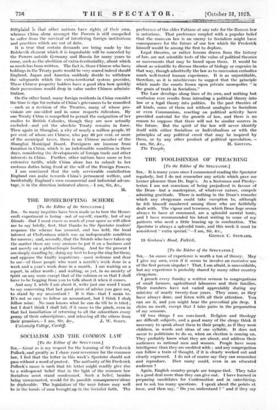SOCIALISM AND THE COMMON LAW .
" [To the Editor of the SPECTATOR.] • SIR,--Great as is•my respect for .the learning of Sir Frederick Pollock, and-greatly as r share your reverence fOr the common law, I 'feel that the letter 'in this week's Spectator should not pass without a word of pretest.. The authority of Sir Frederick Pollock's nanie- is such that' his letter' might readily give rise to a widespread belief that in the light of the common law Socialism must stand - cOndenitied:' Such' a belief, besides being unwarranted; would fin! its possible consequences alone pe deploinble:' -The' regiklatiOn - of the-near future • may _ well be in the hands of men broup,htup-in the Socialist faith. The
preference of the older Fabians at any rate for the Roman- law is notorious. That preference coupled with a popular belief -that the common law is an enemy to Socialism might have consequences for the future of our law which Sir Frederick himself would be among the first to deplore.
Legal theories, or rather lessons drawn from the history of law, are not scientific tests of the value of political theories or movements that may be based upon them. It would be about as scientific to discuss theories of biology or .eugenics in that way, though admittedly the law as to succession embodies much well-tested human experience. It is as unjustifiable, therefore, as it is mischievous to suggest that the principle which made the courts frown upon private monopolies " is the grain of truth in Socialism."
The Law develops along lines of its own, and nothing but confusion ever results from intruding a political theory into law or a legal theory into politics. In the past theories of all kinds, some of them not without analogies to Socialism or even Communism, reacting on political activity have provided material for the growth of law, and there is no reason to suppose that there will not be similar sources in the future. But the spirit of the law will never identify itself with either Socialism or Individualism or with the principles of any political creed that may be inspired by them, or by any other product of political speculation.—






























































 Previous page
Previous page